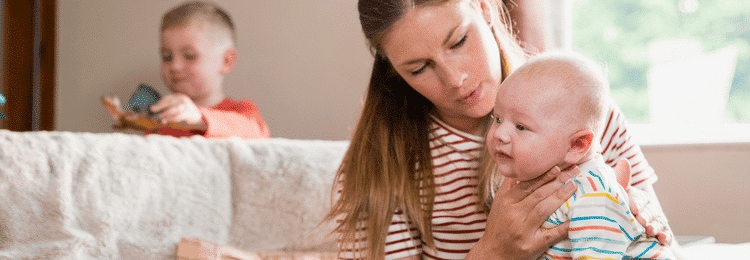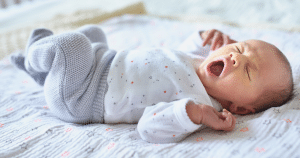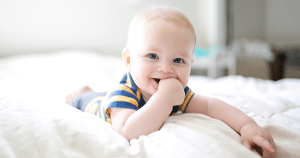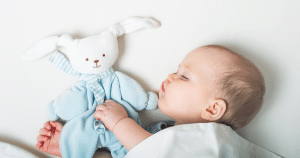Is it ok to put baby to sleep without burping?
Burping your baby is important after they have had a feed. But sometimes babies can fall asleep before you’ve had a chance. So, is it ok to put baby to sleep without burping?
This blog includes:
- How to burp a baby
- Signs a baby needs to burp
- What if my baby won’t burp after feeding?
- How to burp a sleeping baby
- What happens if you don’t burp a baby?
- Colic in babies
- What is ‘spitting up’ in babies?
- Is it ok to put baby to sleep without burping?
Is it Important to Burp Your Baby Before they go to Sleep?
Burping or winding a baby after feeding is important as it helps release air trapped in their stomach, reducing discomfort and potential spit-up. Some babies will need burping throughout their feed and some after.
If your baby has fallen asleep whilst feeding and is not showing any signs of discomfort then it’s usually okay to let them sleep without the need for burping.
However if your baby wakes up shortly after falling to sleep it may be that they need burping.
Why do babies need to be burped?
Babies need to be burped to release any swallowed air during feeding. When babies are bottle fed or breast fed, they may take in air along with the milk. This swallowed air can cause discomfort and bloating as it gets trapped in their tiny tummies. Burping helps to expel this trapped air, reducing the likelihood of discomfort, bloating and gas. It can contribute to a more comfortable feeding experience for your baby and may help prevent issues like colic or excessive fussiness. Burping your baby is mostly important during the early months when a baby’s digestive system is still developing and adjusting to feeding.
Should You Burp a Baby During a Nightfeed?
Yes, any feed can create gas in the stomach so to minimise the likelihood of trapped air causing discomfort to your baby and disrupting their sleep, it is advisable to burp them.
Should you burp your baby after a dream feed?
Even though it may be tempting to put your baby back down to sleep straight after feeding, you should still try to burp them to minimise discomfort and disturbed sleep.
How to burp a baby
Burping a baby might seem a little scary at first because they’re so little. As long as you hold your baby correctly and are gentle, you’ll be fine.
There are a few ways that you can burp your baby, these are:
- Having the baby over your shoulder
- Having the baby sat on your knee
- Having the baby lying over your knees
What to do: Once you’ve found a comfortable position, ensure your baby’s back is straight. Then, gently pat and rub the back until you hear your baby burp. They may not burp at all or they may burp lots. Continue this motion of gentle pats for a few minutes or until your baby stops burping.
Some babies are harder than others to burp. If you find that you’re struggling, you may need to spend a little more time burping. The method you try can affect burping. So, if you can’t seem to get one out, try sitting slightly forward in a seated position.
Whichever burping position you find does the best job will be fine. The most important thing to remember is to keep your baby’s back straight. If your baby’s back is hunched then you’ll struggle to burp them effectively. Make sure that your baby’s head is always supported when using burping positions.
Will my baby burp faster in one position than another? No, it all depends how much excess gas there is. Babies burp when they’re ready to, sometimes even when they’ve fallen asleep. The more air trapped, the more burping your baby will need.
If your baby is prone to spitting up after a feed, you may find it’s best to avoid burping them while lying down. Similarly, if your baby is usually hard to burp then the sitting position could be the best option. This allows their back to remain straight and means gas can travel easily.
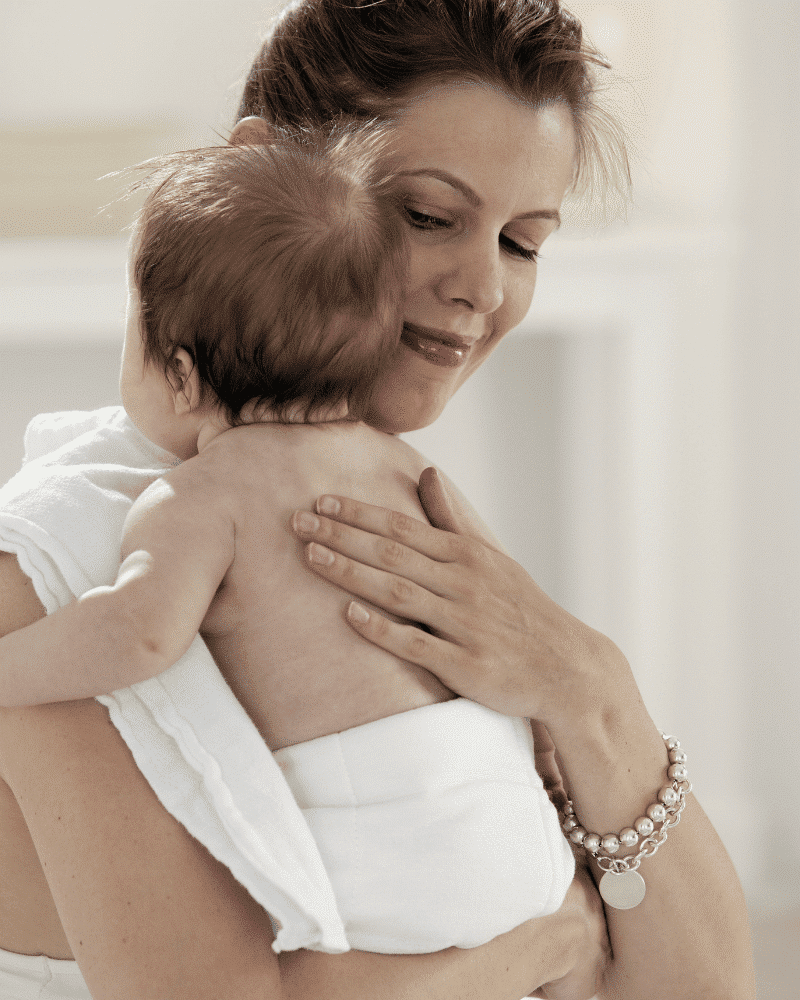
What are the signs your baby needs to be burped?
It’s likely that your baby will need burping after every feed. But if your baby doesn’t often burp, how do you know they need to be burped? There are some signs that you can look out for. Some of the signs that a baby needs to be burped can include:
- fussiness during feeding
- short feeds or uninterested in the feed
- squirming or arching their back
- hiccups
- gurgling sounds
- spitting up
- clenched fists.
If you notice any of these signs, you should spend a bit of time burping your baby. After burping, you might find your baby wants more milk.
If my baby is grunting in their sleep could they need burping?
The majority of time grunting is indicative of a baby trying to pass gas and they just need to figure it out for themselves. It is not necessary to intervene by burping. If your baby is grunting with every breath or has a fever it is advisable to see your doctor.
If my baby is crying in their sleep should I try burping them?
If your baby is crying in their sleep, it does not necessarily indicate a need for burping. Babies can make various sounds, and occasionally crying does not always mean discomfort. However, if the crying persists or is accompanied by signs of discomfort like squirming or clenching fists, you may want to try and gently burp them to see if it provides relief.
What if my baby won’t burp after feeding?
If your baby doesn’t burp after trying for a reasonable amount of time do not worry. Some babies may not always need a burp after ever feed. However, if you are finding it difficult to burp your baby you may want to try changing positions or lying your baby on their back and give them a gentle tummy massage. This helps air bubbles to travel up ready for release.
You may also find that moving your baby’s legs in a bicycle motion helps. This may get things moving for your baby and may encourage them to burp. This might all be fine if your baby wasn’t planning on falling asleep after the feed, but what if they were? How do you burp a baby that’s fallen fast asleep?
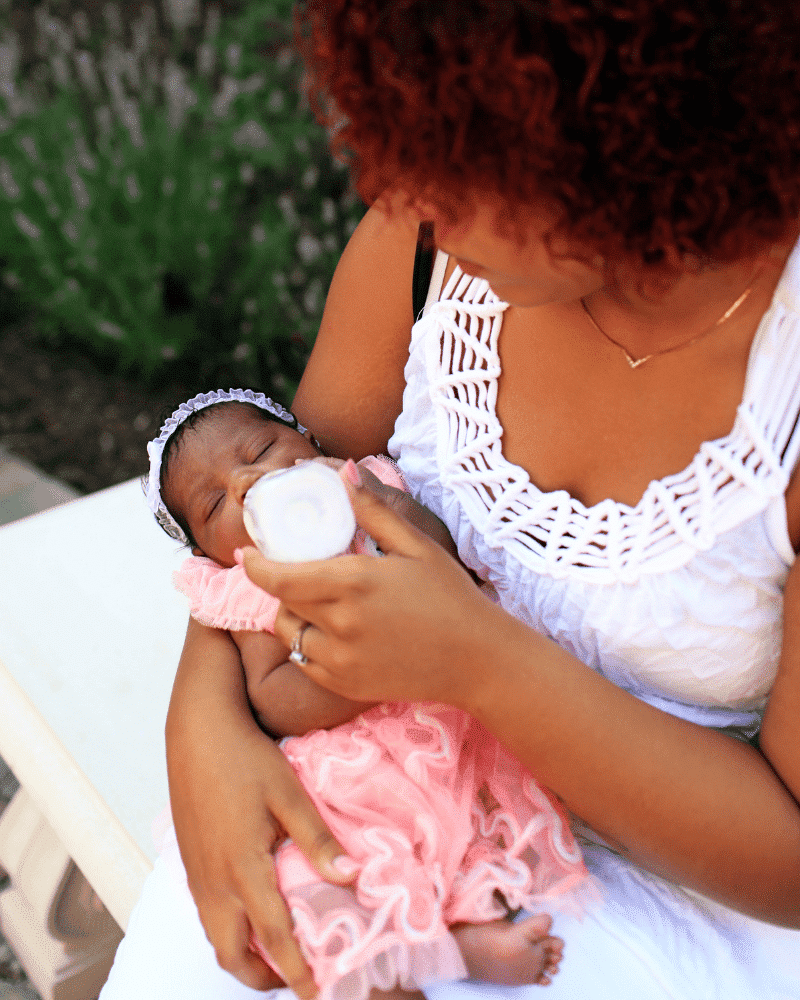
What are the best methods to burp a sleeping baby?
You’ll notice that it’s quite common that babies fall asleep while they’re feeding. If this happens and you haven’t managed to burp them yet, don’t worry. Newborns tend to fall asleep more often due to shorter wake windows.
Burping a sleeping baby is very similar to burping a baby that’s awake. If your baby wakes up while you’re burping them, you could try and soothe them before continuing to burp. Or, you might prefer to burp them and then get baby straight back off to sleep.
If you’d prefer to keep your baby asleep while you burp them, you’ll just have to be a little more careful and slower. Being slower will also help to reduce the risk of spit up. To help a sleeping baby burp, try gently lifting them to a more upright position against your shoulder and patting their back softly. Try not to worry if your baby doesn’t stay asleep, often babies drift back off fairly quickly when they’ve woken up being burped.
Alternatively, lay your baby on your lap with their head slightly elevated or on their tummy across your knees and gently pat or rub their back.
Another great method for getting your baby to burp is by placing your baby across your forearm and gently rubbing their back with your other hand.
This position is referred to as “Tiger in the Tree Hold”. If your baby does not burp after a few minutes it is okay to let them continue to sleep.
Some babies do not need burping as much at nighttime because they eat slower and therefore take less air in whilst feeding.
Sometimes breastfed babies don’t tend to need burping as much as bottle fed babies. This is because the milk flow from the breast is usually faster. This means there’s not as much air flowing to cause trapped gas. That doesn’t mean that bottle feeding is a problem, it’s whatever works for you and your baby.
Remember every baby is different so find the method that suits your little one best.
What happens if you don’t burp a baby
If you don’t burp a baby that needs it, they’re probably going to feel very uncomfortable after swallowing air. As adults and even older kids, we know how to release gas. Newborn babies don’t know how to release built up gas and cannot control it either.
If your baby is showing signs of needing to burp, you need to give it a try. If you plan to put your baby falls asleep when they need burping, you may find that they don’t have a great night’s sleep. As your baby sleeps, they will be lying down, meaning there’s no where for the trapped air bubble to go unless your baby burps. This may cause discomfort in their upper body.
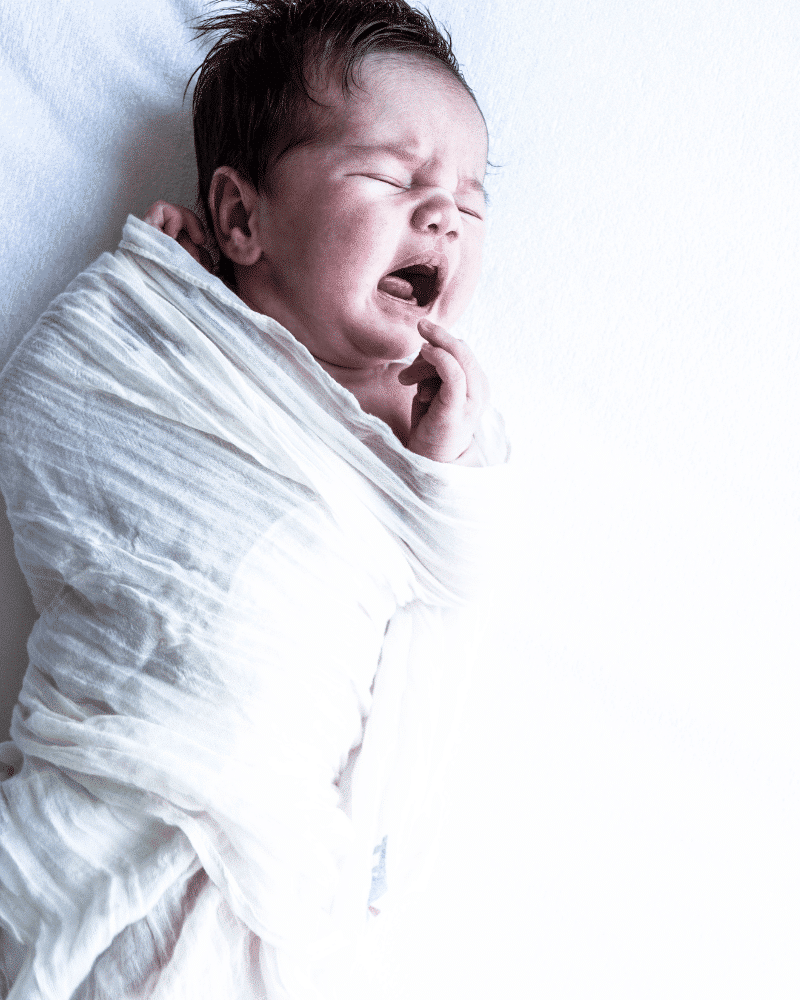
What happens if you don’t burp a baby
If you don’t burp a baby that needs it, they’re probably going to feel very uncomfortable after swallowing air. As adults and even older kids, we know how to release gas. Newborn babies don’t know how to release built up gas and cannot control it either.
If your baby is showing signs of needing to burp, you need to give it a try. If you plan to put your baby falls asleep when they need burping, you may find that they don’t have a great night’s sleep. As your baby sleeps, they will be lying down, meaning there’s no where for the trapped air bubble to go unless your baby burps. This may cause discomfort in their upper body.
Colic in babies
If you’re noticing your newborn crying a lot, you may have a colicky baby. A baby with colic cries more, will be harder to soothe and may be excessively windy. This usually starts within the first few weeks and should finish around the 3 to 4 month mark. There are various suggestions that may help to relieve colic:
- Cuddling your baby to soothe when crying
- Ensuring they are burped after feeding
- Feeding the baby upright (or semi upright position when sleeping)
- Creating a calming atmosphere with gentle music and a warm bath
If there’s a chance that your baby is more irritated for another reason other than colic then seek medical advice. If you’re not sure if it’s colic, you could chat to your GP.
What is ‘spitting up’ in babies?
Spit up is generally liquid that your baby regurgitates after a feed. It usually occurs with a burp. Many babies suffer with this occasionally and keeping your baby in an upright position after feeding can help. Spit up usually only occurs as a dribble, but it can still require an outfit change for both you and baby!
While a small amount of spit up is common, you also need to be aware of other complications such as acid reflux. This is usually spit up accompanied by choking and little weight gain. As your baby’s weight will be monitored, it’s important to recognise the other symptoms.
If your baby is prone to spit up, you should try to keep them upright for around 15 minutes after each feed. This will allow milk to settle and give them a chance to burp if they need to.
Most babies tend to experience spit up in their first 12 months of age. As the body is still strengthening muscles in the digestive system, spit up is common. After this point, you may wish to seek medical advice to be sure it’s nothing else. If your baby is vomiting then they could have an illness and you may wish to seek advice earlier.
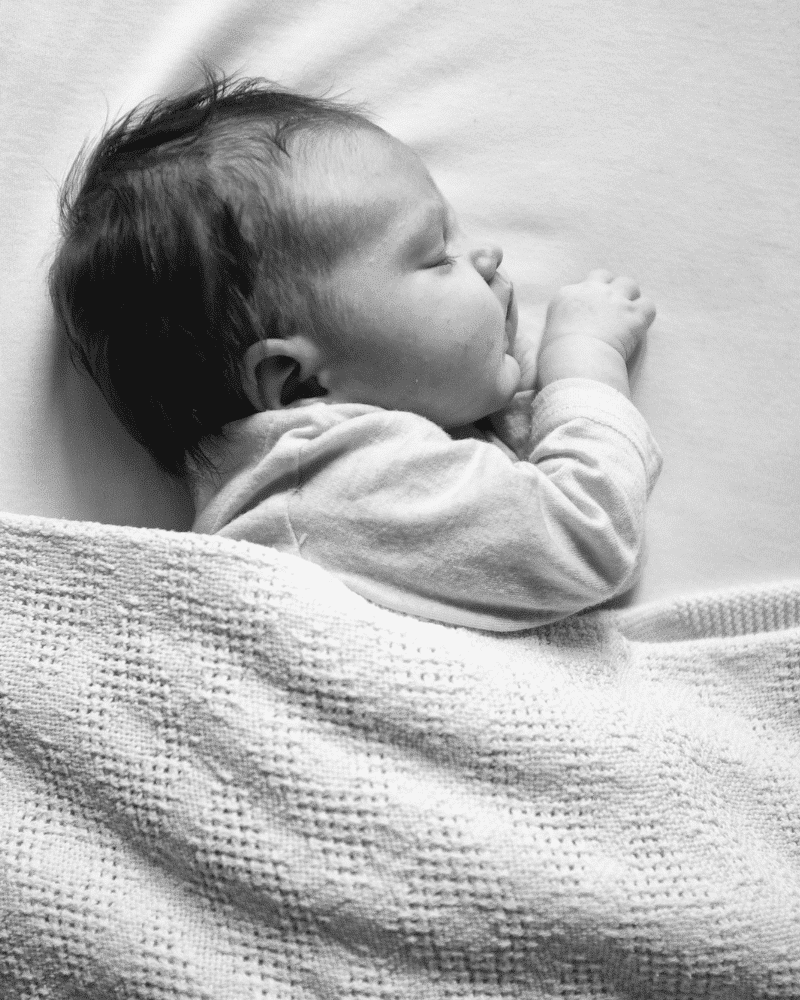
Can I put baby to sleep without burping?
In short, we do not recommend it. We would always recommend trying to help your baby relieve gas. Putting your baby to sleep with trapped gas can cause discomfort and also lead to your baby waking up earlier.
Most newborn babies need to be burped after feeding, whether they stay awake or not is a different story! If you need to burp a sleeping baby, try not to worry. Just take it slow and try to keep them in a slightly upright position. As babies grow, they tend to need burping less. This is because they are able to start sitting up on their own and therefore can allow gas bubbles to release naturally.
I am Sally, an occupational therapist, advanced paediatric sleep consultant (OCN level 6), and the founder of MiniSleepers. I also volunteer for The Sleep Charity's, National Sleep Helpline.
I am extremely passionate about helping families achieve good quality sleep. I recognise the importance of sleep for the wellbeing of the entire family. My aim is to educate, empower and support parents to make positive changes to their little ones sleep.
I offer lots of free advice and hold weekly Q&A’s on my Instagram page @Mini_Sleepers or you can view more information www.minisleepers.co.uk.



